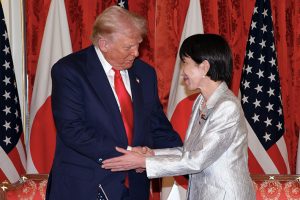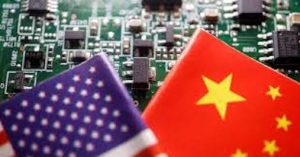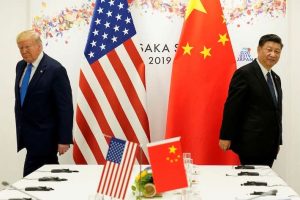The US is increasingly anxious about China’s prowess in quantum computing.
It’s easy to see why. The nation that’s able to lead the field could redefine the way we live and work, taking computers’ problem-solving ability to another level. Quantum computing will influence everything from the fight against disease, to data security and the distribution of goods – and things we can’t even imagine today.
The notion that China could be No. 1 in such a critical technology is anathema to Washington, and arguably a worrying prospect for freedom lovers everywhere. It’s a country with values sharply at odds with the west and is increasingly willing to assert its power.
That’s a key reason why Joe Biden’s administration added a dozen Chinese technology companies to its trade blacklist last year, citing national security and foreign policy concerns. It said it’s particularly concerned that eight of the blacklisted companies could access quantum technology from the US that could be used to help the People’s Liberation Army with counter-submarine and stealth activities as well as enhance its encryption-busting capabilities.
Measures to counter economic espionage are understandable but there’s something broader going on here, too: America is losing confidence in its ability to outcompete China. Whereas it once had an iron-clad belief that western innovation, democracy and business were unassailable, it now fears China’s monolithic, top-down, authoritarian system.
That’s also easy to see why. China has invested heavily in quantum computing, with President Xi Jinping’s government spending US$10 billion on the country’s National Laboratory for Quantum Information Sciences, NDTV reported.
US-China Battle: A Quantum Computing Advantage?
According to NewScientist.com, a quantum computer made by researchers in China, named Jiuzhang, solved a calculation in 4.2 hours that would take a classical computer thousands of years.
This demonstration of what the researchers call “quantum computational advantage” was made using six more qubits – quantum bits – than the computer used by the Google Sycamore team that first demonstrated the feat in 2019.
According to Interesting Engineering, researchers at China’s University of Science and Technology (USTC) in Hefei announced that their quantum computer Jiuzhang 2 worked using 60 superconducting qubits, and that it was a staggering 10 million times faster than Sycamore.
But the US isn’t exactly a laggard itself. Computing giant IBM recently announced that it has built the world’s largest superconducting quantum computer, called Eagle. The new IBM quantum computer is larger than Sycamore as well as China’s Jiuzhang 2.
IBM quantum computer Eagle will more than double the size of Jiuzhang 2 by using 127 qubits to solve problems — a staggering amount of power.
So powerful, in fact, experts say it could theoretically break much of the encryption currently used to secure e-mails and Internet transactions. The IBM quantum computer could also provide unhackable channels of communication.
China is an unprecedented threat nonetheless. The power concentrated in Xi’s hands means China can marshal resources to develop critical future technologies in ways that US President Biden and other western leaders can only dream about.
With the might of their government behind them, China’s state-owned technology companies play by different rules to foreign companies, not having to worry about nuisances like profits. That means they can sell below cost if necessary, putting western competitors to the sword.
So, can a centrally run system that won’t allow freedom of thought actually come up trumps against freewheeling America, the most innovative nation on earth? The outcome is not, as it once was, a foregone conclusion.
However this struggle for quantum computing supremacy plays out, there may still be a silver lining. In a tweet, Michael Pettis, a Beijing-based professor of finance at Peking University, said China’s challenge to US scientific and technological superiority, and the US response, ‘’may end up greatly benefitting the world.’’
• By Dave Makichuk
This article was updated in June 2022.
ALSO SEE:
US Adds More China Technology Firms to Blacklist, Upsets Beijing
Chinese Quantum Computing Outpaces Western Rivals: SCMP
China Seeks First-Mover Advantage in Quantum Computing
China Technology Startup, Blacklisted by US, to File for Hong Kong IPO
























